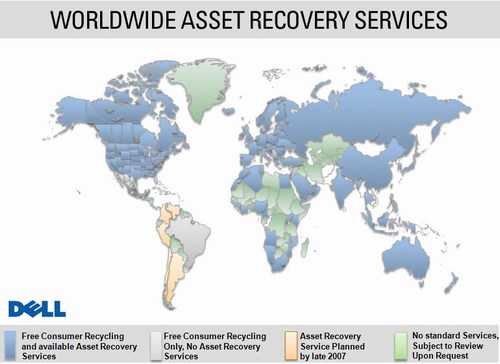Dell and the Environment
From Lauraibm
(→What the Vendor says about itself) |
|||
| Line 4: | Line 4: | ||
==What the Vendor says about itself== | ==What the Vendor says about itself== | ||
| - | + | Dell Recycling offers computer owners a variety of environmentally sound, convenient and affordable options for unwanted computers - and the equipment does not have to be from Dell. Dell Recycling accepts any make or model of computer, notebook computer, monitor, printer or peripheral device. | |
Revision as of 09:29, 6 July 2007
Summary
What the Vendor says about itself
Dell Recycling offers computer owners a variety of environmentally sound, convenient and affordable options for unwanted computers - and the equipment does not have to be from Dell. Dell Recycling accepts any make or model of computer, notebook computer, monitor, printer or peripheral device.
Donate
Dell provides consumers a donation option for old computers. When you are ready for a new system there are neighbors in your community who could make use of your old one. Through Dell Recycling, consumers can donate their computers to the National Cristina Foundation to help disabled and economically disadvantaged children and adults in your own community. The foundation will pick up your computer at your door and put it to good use in your community.
Recycle
If recycling your computer is your preference, Dell offers an environmentally friendly method to dispose of outdated computer equipment that no longer has useful life. Dell is happy to accept any brand of computer, keyboard, mouse, monitor or printer. And Dell will pick it up at your home.
Institutional Customers
Dell has provided asset recovery and system recycling services to business customers since 1991, recycling millions of units since that time. For information on Dell's services for business customers, visit Asset Recovery Services.
Legislative and Regulatory Compliance Dell is dedicated to meeting the requirements of the European Union's WEEE (Waste from Electrical and Electronic Equipment) Directive and is engaged in the development of country-specific implementation schemes to comply with the national WEEE laws. The directive aims to reduce the waste arising from electrical and electronic equipment, and improve the environmental performance of everything involved in the life cycle of electrical and electronic equipment.
(1)
Dell's Chemical Use Policy
Dell's vision is to avoid the use of substances in its products that could seriously harm the environment or human health and to ensure that we act responsibly and with caution.
To act responsibly , Dell believes that if reasonable scientific grounds indicate a substance (or group of substances) could pose significant environmental or human health risks, even if the full extent of harm has not yet been definitively established, precautionary measures should be taken to avoid use of the substance(s) in products unless there is convincing evidence that the risks are small and are outweighed by the benefits. Dell considers these to be "substances of concern."
Dell identifies substances of concern with consideration for legal requirements, international treaties and conventions, specific market demands, and by the following criteria: Substances with hazardous properties that are a known threat to human health or the environment; Substances with hazardous properties that show strong indications of significant risks to human health or the environment; Substances with hazardous properties that are known to biopersist and bioaccumulate in humans or the environment.
To enforce the company's precautionary measures , Dell strives to eliminate substances of concern in its products by: Maintaining a Banned and Restricted Substance Program, Choosing designs and materials that avoid the use of substances of concern, Prohibiting supplier use of these substances contractually, and Substitution of viable alternate substances.
If alternatives are not yet viable, Dell works with its industry partners to promote industry standards and the development of reliable, environmentally sound, and economically scalable technical solutions.
To demonstrate our commitment , Dell is committed to eliminate in our new products all remaining uses of brominated flame retardants (BFRs) and polyvinyl chloride (PVC) by 2009, as acceptable alternatives are identified that will not compromise product performance and will lower product health and environmental impacts. We will review a phase out plan yearly or when required and evaluate available technical, environmental and scalable solutions. Dell is open to discuss these plans and is committed to continuously improve the environmental quality of our products.
(2)
Energy Efficiency
Dell is committed to minimizing its industrial impact on the earth’s climate. Through programs like Energy Smart, we are designing energy efficient products that are designed to reduce power requirements, which in turn, help to reduce carbon dioxide emissions.
We have worked to minimize climate impacts from Dell facilities by purchasing a portion of our electricity needs from renewable energy sources, like the Green Power program at our Austin, Texas facility. We are also a member of the U.S. Environmental Protection Agency’s Smartway program, which aims to minimize emissions from shipping and logistics operations.
(3)

